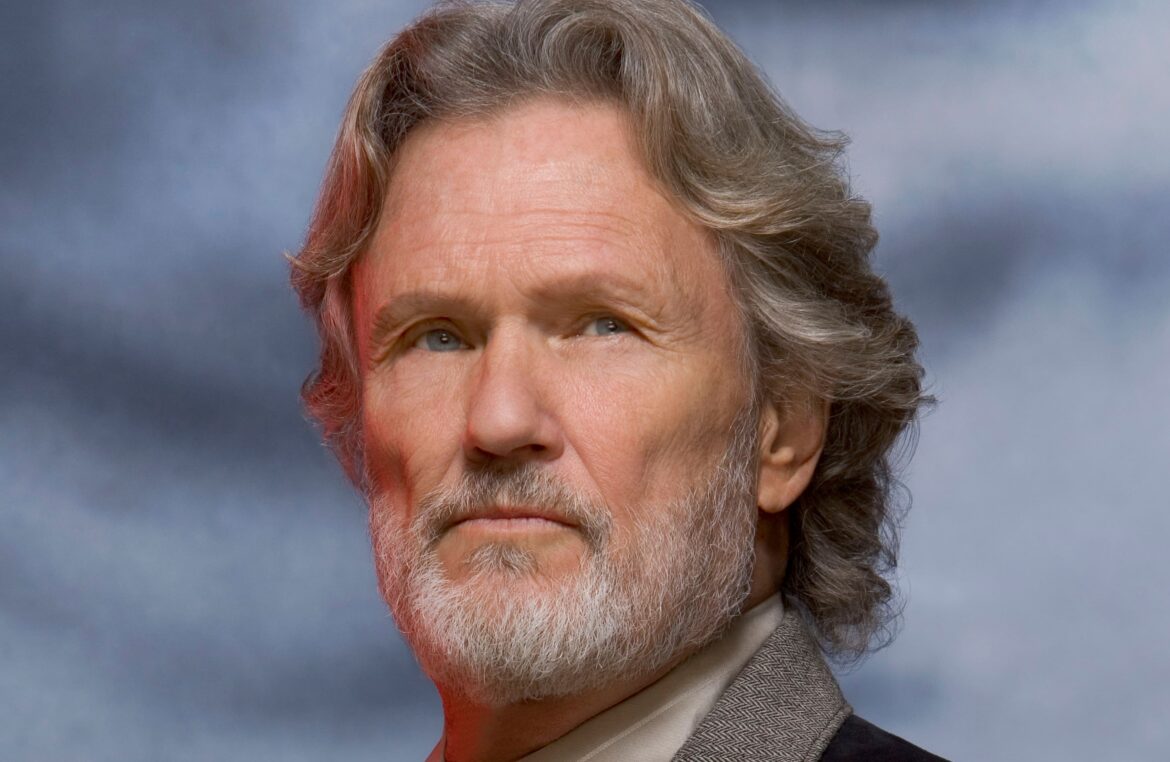
Kris Kristofferson: The Life and Legacy of an American Icon
Kris Kristofferson was born Kristoffer Kristofferson on June 22, 1936 and was a multi-talented artist who left an indelible mark on American culture. A prolific country singer, songwriter, and actor, Kristofferson’s influence extended beyond the music charts to Hollywood and popular culture. Best known for his songwriting prowess, he penned timeless classics like “Me and Bobby McGee,” “For the Good Times,” “Sunday Mornin’ Comin’ Down,” and “Help Me Make It Through the Night.” These songs became hits for various artists, solidifying Kristofferson’s status as one of the most revered and influential figures in American music history.
Early Life and Education
Born in Brownsville, Texas, Kris Kristofferson grew up in a military family. His father was a U.S. Army Air Corps officer, and his upbringing was steeped in discipline and high expectations. As a result, Kristofferson was academically inclined and excelled in his studies. He attended Pomona College in California, where he earned a degree in literature and became a Rhodes Scholar at Oxford University. At Oxford, Kristofferson continued to nurture his literary and creative talents, though he was initially focused on a more conventional career path.
Despite his academic success, including being a standout athlete and an aspiring writer, Kristofferson’s passion for music began to take root during his time at Oxford. His exposure to folk and country music, combined with the growing cultural shifts of the 1960s, pushed him to pursue songwriting more seriously. After completing his studies, he returned to the United States, where he briefly served in the U.S. Army, reaching the rank of captain.
The Breakaway from Conventional Life
Kris Kristofferson’s career could have taken a drastically different turn had he followed his family’s expectations of a military career. However, his passion for music was too powerful to ignore. In a bold move that would ultimately define his legacy, he turned down a teaching position at West Point to pursue songwriting in Nashville.
Kristofferson’s early years in Nashville were marked by struggle. Working odd jobs and facing rejection, he toiled as a janitor at Columbia Studios and worked as a helicopter pilot to make ends meet. Yet, even during this period of hardship, Kristofferson remained committed to his craft. It wasn’t long before his songwriting began to attract attention.
One pivotal moment in Kristofferson’s career was when he famously landed a helicopter in Johnny Cash’s yard, an audacious move that caught the attention of the legendary singer. Cash’s endorsement played a crucial role in giving Kristofferson’s career the boost it needed. Eventually, his songs were picked up by some of the biggest names in country music, and his career as a songwriter began to take off.
The Rise of a Songwriting Legend
Kristofferson’s songwriting is celebrated for its raw emotional depth and vivid storytelling. He brought an authenticity and vulnerability to country music that resonated with listeners across generations. His lyrics often explored themes of love, heartache, and the human condition, and his ability to evoke powerful emotions through simple yet profound language set him apart from his contemporaries.
“Me and Bobby McGee”
One of Kris Kristofferson’s most iconic compositions, “Me and Bobby McGee,” was originally recorded by Roger Miller in 1969. However, it was Janis Joplin’s 1971 version that skyrocketed the song to global fame, reaching number one on the Billboard Hot 100. The song’s mix of melancholic longing and the bittersweet beauty of transient love struck a chord with audiences. It became a defining anthem of its era, and Joplin’s raspy, soulful rendition gave it a timeless appeal.
.
.
Kristofferson’s lyrics, particularly the famous line, “Freedom’s just another word for nothing left to lose,” encapsulated the freewheeling spirit of the 1960s while also conveying a deeper philosophical reflection on life and love. “Me and Bobby McGee” remains one of the most covered and celebrated songs in American music history, a testament to Kristofferson’s genius as a songwriter.
“For the Good Times”
Another standout in Kristofferson’s catalog, “For the Good Times,” was recorded by country legend Ray Price in 1970. The song was a massive hit, reaching number one on the country charts and earning Kristofferson his first Grammy Award for Best Country Song. “For the Good Times” is a poignant ballad about the end of a relationship, yet it emphasizes the beauty of the moments shared rather than the sadness of the loss. Kristofferson’s tender lyrics, coupled with Price’s smooth delivery, made the song an instant classic.
“Sunday Mornin’ Comin’ Down”
“Sunday Mornin’ Comin’ Down” is arguably one of Kris Kristofferson’s most personal and autobiographical songs. Recorded by Johnny Cash in 1970, the song was a major hit, topping the country charts and earning Cash a Grammy Award for Best Country Vocal Performance. The song’s lyrics delve into themes of loneliness, regret, and existential despair. With lines like “There’s something in a Sunday, that makes a body feel alone,” Kristofferson captures the quiet, often painful introspection that can accompany life’s low points.
Cash’s rendition of “Sunday Mornin’ Comin’ Down” resonated deeply with listeners, particularly those who identified with the struggles of post-war America. The song remains a staple of Kristofferson’s repertoire and a beloved classic in the country genre.
“Help Me Make It Through the Night”
Perhaps one of the most intimate and vulnerable songs Kris Kristofferson ever wrote, “Help Me Make It Through the Night” was recorded by Sammi Smith in 1970. Smith’s version became a crossover hit, earning her a Grammy Award for Best Female Country Vocal Performance. The song’s simple yet emotionally charged lyrics explore the need for human connection in times of loneliness. Kristofferson’s frank portrayal of desire and vulnerability broke new ground in country music, challenging the genre’s traditional themes of stoicism and masculine strength.
The Transition to Acting
While Kristofferson’s songwriting achievements alone would have cemented his place in American cultural history, his talents extended far beyond the world of music. By the early 1970s, Kristofferson began to explore a career in acting, and his rugged good looks and undeniable charisma quickly made him a sought-after leading man in Hollywood.
His breakthrough role came in the 1976 film A Star Is Born, in which he starred opposite Barbra Streisand. Kris Kristofferson’s portrayal of a troubled musician earned him critical acclaim, and he won a Golden Globe Award for Best Actor in a Motion Picture Musical or Comedy. The film’s success solidified his reputation as a serious actor, and he went on to appear in numerous films, including Pat Garrett and Billy the Kid (1973), Convoy (1978), and Heaven’s Gate (1980).
Despite his success in Hollywood, Kristofferson never abandoned his music career. He continued to release albums and tour, balancing his dual careers as a musician and actor. His ability to seamlessly transition between these two worlds was a testament to his versatility and creative spirit.
The Highwaymen: A Legendary Collaboration
In the 1980s, Kris Kristofferson became part of the supergroup The Highwaymen, alongside country legends Johnny Cash, Willie Nelson, and Waylon Jennings. The group’s blend of outlaw country and folk influences struck a chord with audiences, and their debut album, Highwayman (1985), was a commercial success. The title track, “Highwayman,” became one of their signature songs, showcasing the unique vocal talents of each member.
The Highwaymen represented a coming together of four of the most iconic figures in country music, and their collaboration was both a celebration of their individual legacies and a bold new chapter in their careers. The group went on to release two more albums, Highwayman 2 (1990) and The Road Goes on Forever (1995), further cementing their place in country music history.
.

.
Kristofferson’s Legacy
Over the course of his long and illustrious career, Kris Kristofferson became a symbol of artistic integrity and creative fearlessness. His willingness to tackle complex and often controversial subjects in his music set him apart from his peers, and his influence can be heard in the work of countless artists who followed in his footsteps.
Kristofferson’s accolades are numerous, including induction into the Country Music Hall of Fame in 2004 and the Grammy Lifetime Achievement Award in 2014. Beyond the awards and accolades, however, it is Kristofferson’s deep connection with his audience that truly defines his legacy. His songs continue to resonate with listeners of all ages, offering comfort, solace, and inspiration in times of joy and sorrow alike.
Kris Kristofferson’s death on September 28, 2024, marked the end of an era, but his influence and legacy will undoubtedly live on. From his groundbreaking contributions to country music to his celebrated film career, Kristofferson’s life was a testament to the power of creativity, passion, and perseverance. His work remains a timeless reflection of the human experience, reminding us all of the beauty, heartache, and joy that comes with living life to its fullest.
Check out Kris Kristofferson on Amazon.
Check out The Highwaymen on Amazon.
If you found this interesting please share it with your friends and family, and why not check out our articles on some other Country Music Musicians who have sadly died.
.

